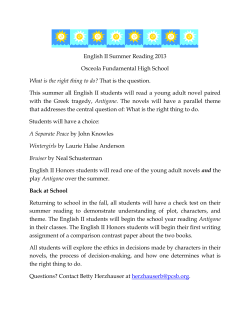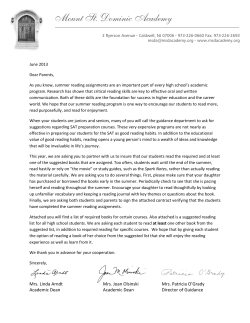
Frequently Asked Questions Q: What is a mod?
Frequently Asked Questions Q: What is a mod? A: A mod is half a regular class period (20 minutes). Each period is identified as two mods, because there are a few classes that comprise one and a half regular class periods. Mod designations allow for three-mod classes and related single mod study halls. Q: What does a typical student's schedule look like? A: There is really no such thing as a “typical student’s schedule”. It may even be safe to say that no two students’ schedules are alike. However, students who are not taking honors math or honors science will have nine class periods in a day, one of which would be the lunch period. Each semester, they will have the same classes each day, in the same order. At the change of semesters, full-year classes will continue in the same time-frame, but half-year (2.5 credit) classes may occur in any period that was not already filled by a full-year class. In other words, a freshman may have Financial Literacy second semester in the period that PE 9 was scheduled in the first semester, and lunch in the period that was Advanced Academic Literacy. PE and health cannot occur in the same semester, and every effort is made to schedule AAL and Financial Literacy in different semesters. Students who are taking honors math and/or honors science courses should expect those classes to take up two full periods in their day, as no class can be scheduled in the remaining mod. Q: My older child, who took Honors Physics, had a 20-minute lunch and was able to fit an elective into the schedule. Why can’t my incoming freshman have that opportunity? A: As long as there are over 100 incoming freshmen planning to take Honors Physics, it will not be possible to offer the opportunity to take physics with an adjacent lunch period to everyone upon request. Since physics is a lab science, overloading a class becomes a safety issue. And, since Honors Physics is a three-mod class, we can only offer four or fewer that occur during the lunch mods. This means that some students will necessarily be scheduled by the computer into physics classes that occur during a non-lunch period. When we receive requests to move those students, we must consider what is fair to all the other students, in addition to the impact on the rest of the schedule. Q: What are the required classes for a Freshman? A: All North Hunterdon freshmen must take English, American History I, math, physics, physical education and Health 9. Classes that are required for graduation and strongly encouraged for the freshman year include: a world language, Advanced Academic Literacy (A.A.L.) and Financial Literacy. Students who are not able to take A.A.L. in the freshman year will take it with freshmen the following year, or default to taking Public Speaking in 11th or 12th grade. Q: What are the required courses for graduation? A: See page 3 of the Course Selection Guide: (See last page for link.) Q: How many credits can a student take in one year? A: It may be possible to schedule as many as 45 credits in a year, if the student does not have lunch or any three-mod classes, or if the student is taking one or more credit-bearing, selective music classes that meet during the after-school C&I time. Q: What does a student do about lunch if there is no room in his or her schedule? A: All students should have a scheduled lunch period unless a parent has provided written approval for lunch to be left out of the schedule. A student who does not have a scheduled lunch period may ask a teacher for permission to eat in class, and may request a pass from the Assistant Principal for C&I to buy food on the way to that class. Some students who do not have a regular lunch period may have a study hall earlier in the day. Those study halls are located in a cafeteria, where the student will have the ability to eat a snack at that time. Snacks may be purchased or brought from home. Q: What is the difference between a Core, College Prep, Honors and AP class? A: Although our general-level classes are no longer designated as “Core,” most departments still have three or four levels of courses that differ by academic rigor. Questions about the differences between specific courses should be addressed to the supervisor of that department. Advanced Placement (AP) courses are on another level, though, because they follow a standardized curriculum overseen by The College Board. The AP curriculum is intended to enhance the probability of college credit being awarded to students who score highly on the optional end-of-course assessment (The College Board’s AP test). AP courses should be considered as college-level course work. Q: Can a student move up a level (i.e. CP to Honors) from one year to the next? Can he or she move down a level, as well? A: Yes, it is strongly encouraged that students and their parents evaluate the progress in the current year, in consultation with the teacher, when selecting course levels for the next year’s schedule. It is also important to realize that a student may be at different levels in different subject areas, and that is perfectly normal. No student should feel that he or she is “locked into a track” because of choices made early in the high school career. Q: What happens if a student starts the class and is not successful, can he or she move down to the lower level? A: Each student’s situation is evaluated individually. Q: When is the latest (in the school year) that a student can move down a level if a class is too difficult? A: This is also a case in which each student’s situation is evaluated individually. If a level change is approved before the middle of the second marking period, the original class will not be reflected on the transcript. It is important to note, however, that the grade from the original course will follow once a marking period has been completed. Q: When is the latest that a students can make changes to their schedules? A: Since the tally of students’ course requests drives the master schedule and staffing decisions, it is important to make choices in January with the intention of honoring those choices as a contractual decision. However, individual students’ needs are taken into account when a request for a change is clearly in the educational best interest of the student. (See response to question above.) Q: Can students take honors physics if they are not in honors math? A: Any student who has demonstrated a solid mastery of algebra may request permission of the NHHS science department supervisor to take Honors Physics. Q: Can a student take more than one language in a year? A: It may be possible to take more than one language in a year; however, it must be understood that this choice will have an impact on the ability to schedule electives. Students who wish to study more than one language during the high school years may wish to investigate the Early Credits Program at Raritan Valley Community College. Families who have further questions about this topic may wish to speak with the Director of Guidance. Q: Can a student change guidance counselors? A: It is not usually advisable to change guidance counselors. Any parent who is dissatisfied with the child’s counselor is strongly encouraged to contact the Director of Guidance as soon as an issue may seem to be occurring. If an issue cannot be resolved in any other way, a change of counselor may be the only remaining option. In that case, a new counselor will be assigned by the Director of Guidance based upon counselor caseloads and the grade level of the student, with other factors taken into account, as appropriate to the best interest of the student. Q: How does the random drug testing program work? A: As stated in the BOE and District Policy: All student athletes MUST COMPLETE AND RETURN to their Coach the Random Drug Test Consent Form on the first day of practice. Students participating in extra-curricular activities not required by the Board of Education for graduation and students receiving parking permits for on-campus parking MUST COMPLETE AND RETURN their form by mail or hand deliver to the person in charge of the activity or parking permits. For further information, see “Random Alcohol and Drug Testing Policy” in the Parent and Student Handbook, which includes links to the Board of Education policy and other useful information. (see last page.) Q: If parents have a question regarding a student's placement in a class, who do they speak to? (i.e, teacher, department head, guidance counselor, etc.?) A: The parent of a current high school student should speak with the teacher first. If further questions occur, the department supervisor should then be consulted. The parent should consult the counselor if the question of placement concerns the overall academic program of the student. The Guidance Department defers to the academic departments with regard to subject(or teacher-) specific issues. Ideally, a student who feels misplaced in a class will discuss this issue with the teacher, and will also meet with the counselor for advice, before any further questions need to be addressed. Q: If a student is having difficulty with a teacher, who do they speak to? (teacher, department head, guidance counselor, etc.?) A: A student who is having difficulty with a teacher which cannot be resolved by speaking directly with the teacher, should speak with that teacher’s supervisor about the issue, or the parent may speak with the supervisor. Q: Does a parent have to take the recommendation of the 8th grade teacher regarding placement or can they override the decision regarding placement? A: A parent who disagrees with the recommendation of the 8th grade teacher may speak with the high school department supervisor about this decision. The supervisor may approve an alternate recommendation, or may recommend that additional, later test results be used to inform the final decision. It is important to note that placement is not dependent upon the eighth grade teacher’s recommendation alone. Final grades in previous years, and performance on the ASK tests, are also included in the recommended placement decision that should be noted by the eighth grade counselor. A change in the teacher’s recommendation may not be enough to outweigh the additional factors that are taken into account. Ultimately, however, there is an override procedure that can be initiated with the high school’s department supervisor. Q: What type of extra help is available if needed? How do students arrange that? A: A student who wishes to pursue extra help should speak with the teacher about meeting during the after-school C&I time, or possibly during a study hall or lunch. The teacher can also provide a pass for the student to access extra help in the department’s resource room during a free period in the school day. A student may also be able to be assigned a “peer tutor” in some subjects. The counselor can assist any student who needs help in accessing these options. Q: How does the "late bus" work? A: Buses are available at 3:10 on Mondays, Wednesdays and Thursdays for students who wish to stay for extra help or participate in clubs. A student who is planning to take the 3:10 bus home for the first time should stop in to the Guidance Office where the secretary can assist them to find the appropriate bus. There are fewer buses at 3:10, so the student may find it necessary to walk from a different bus stop. Q: What forms are students required to have on file with the school (Health/AUP...)? And which ones are needed to be completed each year? A: See the Health Office page on the website, www.nhvweb.net/nhhs/health.htm. Q: Can you request a certain teacher? A: No, it is not possible to honor requests for certain teachers. Q: Do all teachers post assignments on their wiki pages? A: Teachers post assignments on HomeLogic or their own webpages. Q: Do all teachers in same subject matter at same level follow the same grading policy? A: Grading is a teacher responsibility but grading policies are coordinated at the Department Level. Q: Do all teachers in same subject matter and level follow same chronology of their curriculum? A: Curriculum is department and course specific. Chronology may be dictated by resources needed and available. Q: Can you change teachers within same level? A: No, teacher preference is not considered an appropriate reason for a schedule change. Q: My son/daughter cannot hear the announcements in class. How can I find out what is going on? A: The Daily Announcements are posted on the North Hunterdon website, www.nhvweb.net/nhhs. Q: What do I do if my child is going to be absent/late to school? A: Call the attendance office at 908-713-4199 Q: How does the attendance policy work? A: See Parent & Student Handbook: http://www.nhvweb.net/nhhs/Parent-Student-Community-Handbook.htm#Attendance. Q: What do I do if I have to pick my child up early from school? A: Please see “Attendance” in the Parent and Student Handbook. (Above.) Q: How can my child get involved in extra-curricular activities? What about sports? A: Students should listen for morning and afternoon announcements about club meetings. Students do not need to sign up in advance they can just show up for meetings. In order to participate in clubs, students need to have a random drug testing form submitted each school year. Students can also check out the student activities website (http://www.nhvweb.net/nhhs/studentactivities/index.php) which has an updated meeting schedule listed. Q: Is there information about the different extra-curricular activities available on the website? A: Yes, information about all sports and clubs can be found on the website. Announcements are made regarding club meetings throughout the year. Organizational meetings for the various sports prior to the beginning of the season are also announced. Advisors can be contacted by email links found on the website. (See last page.) Additionally, there is an Athletics and Activities Fair at the end of the first half school day for Freshmen at the end of August. Q: What is National Honor Society and is my child eligible? A: The National Honor Society is a selective, nationally-recognized club that pursues a variety of community service projects throughout the school year. An invitation to apply for acceptance is offered by letter to students who have achieved a specific cumulative grade point average in the spring of the junior year. Those students must complete an application which includes hours of community service and leadership as part of the criteria for acceptance. There is also a second round of application opportunities at the beginning of the senior year. For complete information, check the Student Activities webpage on the NHHS website, under “Community Service Clubs.” (See below.) Useful Links for Further Information: Parent-Student Handbook 2011-2012: http://www.nhvweb.net/nhhs/Parent-Student-Community-Handbook.htm Student Activities: http://www.nhvweb.net/nhhs/studentactivities/index.php Athletics: http://www.nhvweb.net/nhhs/athletics/
© Copyright 2025


















